Is that a real ghost hunter… or have they been pretending, perhaps for years?
It’s a legitimate question.
Some people look at ghost hunting, and they see gullible people. Con artists see an opportunity for financial gain, celebrity status, or power.
Sure, some people think they’re more skilled than they really are.
They’re not con artists… or they don’t start out that way.
When I talk about scammers and con artists, I mean the people who look you straight in the eye and tell you lies.
All they care about is personal or professional gain.
Here’s what to look for.
The Biggest Cons Are About Money
The first rule is: Never give or loan money to anyone without getting a signed, dated receipt. (It’s a good idea to have a long-time, trusted friend as a witness, as well.)
I don’t care how nice the person seems. If it’s a loan, also have the terms in writing before you give the person anything.
Create a contract. It doesn’t have to look super-formal. Handwritten is okay.
Include the following in it.
-
- When the loan was made, and the full names of the people involved.
- How much it was.
- If the loan will be repaid over time, list expected repayment amounts and dates, and what will happen if those terms aren’t met.
- When it’s going to repaid in full, and what will happen if the loan isn’t repaid on time.
- Interest (if any) you’re charging, or if you’re not charging interest.
And, never give or loan money that you can’t afford to lose.
Keep your money safe. Then, look for other signs of a scam or a con artist.
After all, most legitimate businesses – or those starting a business – go to a bank, a credit union, or immediate family for short-term loans. Online options include sites like GoFundMe, Kickstarter, and so on.
If the person is asking you for money, instead of borrowing from usual resources, ask yourself, “Why?”
Know the Warning Signs
- Con artists are charming… sometimes too charming.
They tell great stories, as if they’ve lived the kind of life you’d like to live. They seem to be successful or they look like rising stars. You feel like you have a connection with greatness.
- Con artists collect friends as quickly as possible.
This is partly because they’ll lose so many friends, as people become suspicious. The larger scammers apparent entourage or fan club, the more you’re likely to believe their extravagant claims.
- Con artists seem to have dazzling credentials.
Their friends include famous people. Their degrees (or titles) are impressive. They talk about their past experiences, pending TV shows, and celebrity events they’re planning. Their claims are so extravagant, you think, “Who’d make this up?”
- Con artists separate people so they don’t swap notes.
A con artist leads you to believe that you’re one of the only people he likes and trusts. He says he doesn’t trust this person… and then that one. Following his advice, you’ll stay away from them. The con artist knows: if you got together and exchanged stories, his lies might be exposed.
Lies Are Their Downfall
Con artists get a thrill – an adrenaline rush – each time they lie and get away with it.
They can’t stop lying for very long… and they’re often lying on a grand scale.
Check the person’s claims and credentials.
Check all of them, not just the first few that he or she mentions. (I’ll talk about the con artist as if the person is male, but there are no gender limits on scammers.)
Check These Types of Claims
Ministers
Let’s say that he claims a degree or a title, such as ‘doctor’ or ‘reverend’. Ask what kind of degree (or title) it is, and where it came from. Anyone can become a legally ordained minister, for little or no expense.
Here’s one resource: the Universal Life Church
Certified
As I mentioned in my article about certified ghost hunters, “certification” only means someone or some organization issued the person a certificate.
For example, until mid-2021, students of my free Ghost Hunting for Beginners Course were offered a free Certificate of Completion on the honor system.
Then, 90% of people clicked from the course page to the certificate download page, without taking the lessons. So, I discontinued it, but those certificates are still out there, so be wary. Ask questions to determine if they actually took – and completed – the course.
In general, anyone can print that certificate and claim that it means something… but really, it’s only as good as their sense of integrity.
Higher Education and Degrees
Some mainstream universities give honorary degrees. I’ve been awarded a few of those, myself.
It’s flattering.
There’s nothing wrong with having that kind of title, and some do require actual work to achieve the degree.
However, it’s not really a formal, four-year+ degree.
If it’s a degree from a university, check the university’s alumni records office.
Ask if the person is a graduate of the school, college or program. (Many schools proudly post an online list of some of their former registered students and graduates. In some cases, you can also use classmates directories, online, for more information.)
Please note that many universities offer extension school courses, online study, and other legitimate educational opportunities that can lead to a degree.
However, to receive a degree from that institution, most (not all) students must be formally accepted to a degree program. A paper trail usually exists.
Diploma Mills
Some “diploma mills” offer degrees (for a fee), too.
If you’re not sure about the college or university, research them. Even if they claim to be accredited, their accreditation may be fake.
Hereditary Titles
If someone claims a British (or other) hereditary title, check Wikipedia. It lists the qualified holders of hereditary titles, including their actual surnames, and when the title was created.
People in the U.S. – and other countries where formal titles aren’t awarded — can be dazzled by claims to a real title.
Always check the person’s credentials, no matter what their IDs say. Fake IDs are available everywhere, and con artists know that a convincing fake ID is a smart investment.
If the person claims to have a title, look it up.
For example, here’s one page at Wikipedia, listing people who hold the British title of Marquess: http://en.wikipedia.org/wiki/List_of_marquessates_in_the_peerages_of_the_British_Isles
If the person’s title is vague but you know their legal surname, David Beamish maintains a list of members of the United Kingdom peerage from 1801 to the present day, and he has indexed it.
It’s at http://website.lineone.net/~david.beamish/peerages_az.htm and other pages at that website. You’ll also want to check Wikipedia’s list of the Peerage of England.
In many countries, someone can legally change his first name to “Lord” or “Baron,” and so on. So, don’t be too impressed if the person’s driver’s license, passport, or library card shows that kind of name. (For example, filmmaker Sacha Baron Cohen isn’t an actual British baron. But, unlike con artists, he doesn’t seriously pretend to be one.)
You’ll find other legitimate lists of hereditary titles if you search using phrases like “list of [country] nobility.” Here are a few: French nobility – Lists of French noble families (in French) – Lists of nobility (at Wikipedia)
Celebrity Connections
If the person claims to have worked with or for a celebrity, confirm that. Find the official website of the celebrity, and contact the person’s manager or press agent. Ask if the celebrity has worked with the person who’s making the claim.
If the person claims to have been a paranormal investigator for many years, there should be clear evidence of that, online.
Even if the person didn’t have his own website, other people will have mentioned the person, at least in reference to a case, a “ghost story,” or an investigation.
You can see how long ago they registered their domain name by using a WhoIs lookup.
(I’m not being critical of people who are new to the field; many are excellent researchers. This article is about lies that reveal a con artist.)
Cast Members and Media Appearances
If someone suggests that they’ve been on a TV or radio show, or appeared on stage, check that online. Go to the show’s official website and search for the person’s name.
(Remember that anyone can add a comment after an article or in a forum, making it appear that someone was in a show. You’re looking for official cast lists and official lists of guest stars.)
A claim may seem harder to verify if the show was cancelled years ago. It’s not that difficult. In most cases, show information remains online for years, even decades after the show is all but forgotten.
The following are a few older ghost-related TV shows sometimes used as references. This kind of “reality” show became so popular, a complete list would be very long.
Some con artists prefer to claim they were on shows so old, it’s difficult to find a reliable list of cast, crew, and guest stars. The following links may help, and some shows include full cast lists at IMDb.
Every major ghost-related TV show and movie is represented by at least one webpage or website. If all else fails, check IMDb and Wikipedia.
If You Find a Con Artist, Tell Others
Fortunately, few people in ghost hunting seek a shortcut to fame or fortune… or plain old control over others, aka a “power trip.”
Almost any person’s claims and credentials can be verified using independent sources.
Don’t assume that the person is “too nice” to lie to you, or their friends are too bright to be conned. The more impressive the person’s stories and claims, and the more convincingly they tell them… the more you must verify them, independently.
If the person is a con artist, it’s better to find out early. Thankfully, scams and con artists are a tiny minority. (To quote the movie, Grease, “They’re amoebas on fleas on rats.”)
Avoid them when you can. Report them to law enforcement if they may have committed crimes.
Though it’s important to be watchful for scams and con artists, it’s also important to keep things in perspective.
The vast majority of people who work in paranormal fields are just like you. They’re kind, sincere and genuine. You’ll meet many of them at events, investigations, and in the field. They deserve your friendship and admiration, and they make ghost hunting even more personally rewarding.

Yes, I Was Conned
Over 10 years ago, I was conned. I wrote this article shortly after that painful truth came to light.
Even now, I’m not sure how many people were involved.
It was a clever ruse, and I fell for their extravagant claims. They talked about money, celebrity connections, TV appearances, and more.
I thought no one would make that up. It seemed so easy for anyone to fact-check their claims, I didn’t bother. (Big mistake on my part.)
Then, one of them went too far.
He mentioned a connection to a noted family (with relatives in my hometown) and – instantly – I knew he was lying.
I quizzed him further, expecting him to correct the obvious error.
He didn’t. In fact, he dug himself in, even deeper.
That’s when I began looking into his other claims… and everything unraveled.
In fact, one associated con artist gave the most damning evidence against the guys who’d conned me (and too many others).
The associated con artist was doing damage control, in case he was revealed as an opportunist, too. (Eventually, he was.)
I’m still sad about what happened, but I had to speak up.
Those of us who’d trusted the guys… we looked foolish.
Some friends had lost thousands of dollars. Charges were filed against the con artists.
The tragedy is, the highest-profile member of the team was a truly gifted psychic.
He made poor personal and business choices, and that brought him down.
Since then, I’ve also learned about convicted sex offenders (be careful around strangers in dark settings) and other criminals in the ghost hunting field.
Other Ghost Hunting Professionals Were Conned, Too
A few years ago, professionals revealed alarming financial issues with my former manager.
Thank heavens I’d stopped working with him long before his problems came to light, but I feel so very sorry for friends who lost money to him.
Worse, he’d been using my name to gain access to celebrity acquaintances and wannabe stars alike.
Please be cautious, even when the individual or team seems bright, fun, and on the brink of becoming celebrities.
Be especially wary if your “gut feeling” tells you that something’s not quite right – or has suddenly changed – with that person.
Trust your instincts, and question everything.
 Are you afraid of demons?
Are you afraid of demons?
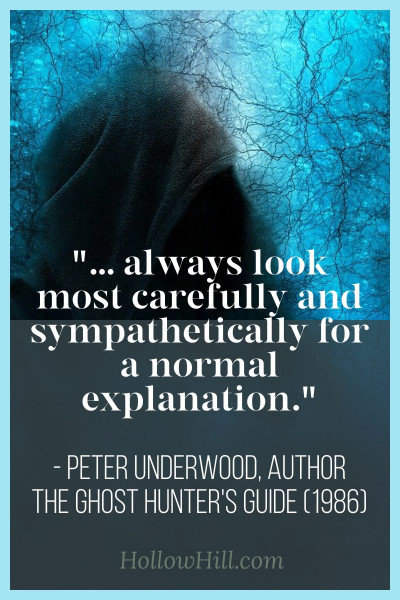

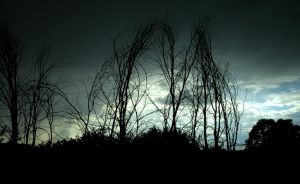 If something odd is going on and you feel in great danger, get out of that house.
If something odd is going on and you feel in great danger, get out of that house.
 Poltergeists cause unexplained noises, and move objects with unseen hands.
Poltergeists cause unexplained noises, and move objects with unseen hands. In my opinion, people who casually shrug off all poltergeists have never witnessed much poltergeist activity.
In my opinion, people who casually shrug off all poltergeists have never witnessed much poltergeist activity.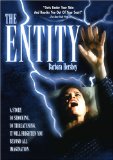
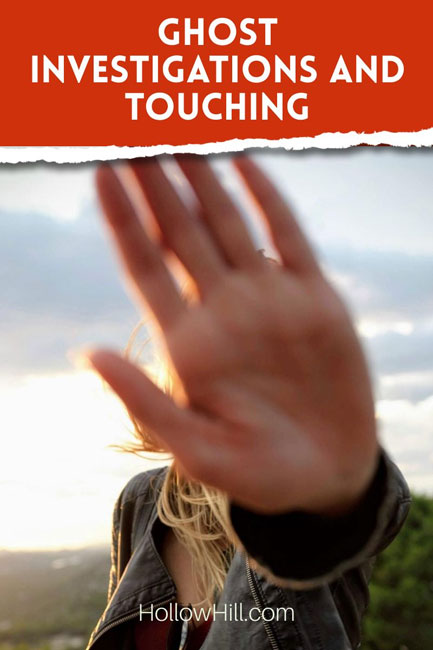 A ghostly hand touch or brush your face or neck.
A ghostly hand touch or brush your face or neck. Likewise, in the early 19th century, a kiss was considered so significant, some expected a marriage proposal to follow immediately.
Likewise, in the early 19th century, a kiss was considered so significant, some expected a marriage proposal to follow immediately. Some of our most colorful investigations (and ghost stories) are related to locations that were once bordellos.
Some of our most colorful investigations (and ghost stories) are related to locations that were once bordellos.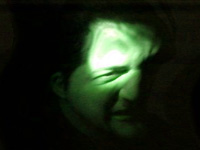 This additional issue is rare, but important.
This additional issue is rare, but important.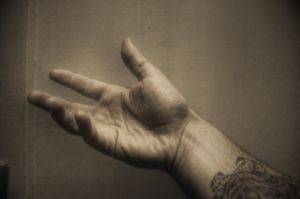 Here’s the rule: If you feel that you’ve been touched (or had a physical encounter of any kind) -by a ghost or someone in physical form – say something immediately.
Here’s the rule: If you feel that you’ve been touched (or had a physical encounter of any kind) -by a ghost or someone in physical form – say something immediately.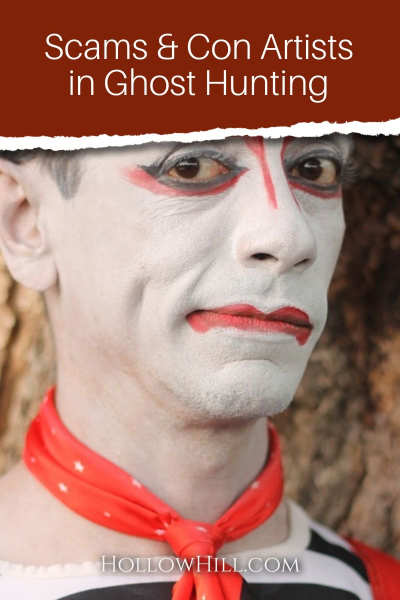
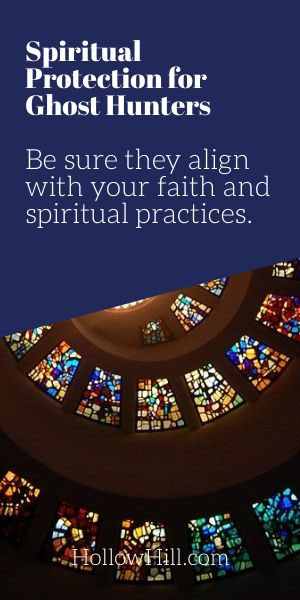 After all, we usually don’t know how dangerous a site is until we investigate it.
After all, we usually don’t know how dangerous a site is until we investigate it.
 From what I’ve learned about demonic activity, I would use Holy Water only in situations where there is absolutely, positively no likelihood of malicious and demonic energy.
From what I’ve learned about demonic activity, I would use Holy Water only in situations where there is absolutely, positively no likelihood of malicious and demonic energy.
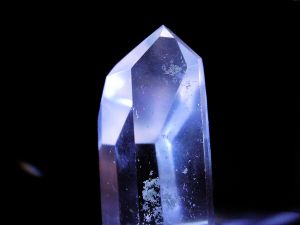 Here’s what I carry: I have a couple of crystals in my wallet. One is a
Here’s what I carry: I have a couple of crystals in my wallet. One is a